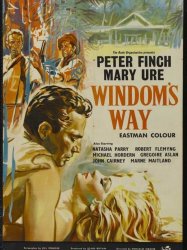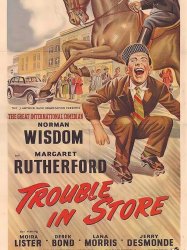Jill Craigie is a Actor, Director and Scriptwriter British born on 7 march 1911 at Fulham (United-kingdom)

Jill Craigie (7 March 1911 – 13 December 1999) was an English documentary film director, screenwriter and feminist. She married Labour Party politician Michael Foot (1913–2010), whom she met during the making of her film The Way We Live.
She became politicised because of the events of the 1930s and she turned to filmmaking. Her films depicted her socialist leanings and dealt with left-wing topics such as child refugees, working conditions for miners, and gender equality. After directing five films and writing two others, Craigie retired from the film business for almost forty years, returning to make a single film for BBC television.
Craigie was one of the scriptwriters of Trouble in Store, Norman Wisdom's film debut, which screened in December 1953. The film broke box office records at 51 out of the 67 London cinemas in which it played. After writing the first draft of the script, Craigie reportedly asked that her name be removed from the credits after learning of Wisdom's participation.
In latter years Craigie became an authority on the suffragette movement, holding a large collection of feminist literature in Britain, with pamphlets dating back to John Stuart Mill.
Craigie had a daughter, Julie, from her first marriage. She and Michael Foot had no children together, but enjoyed family life with Julie and, later, her four children. They lived in a flat in Hampstead, north London, and in a cottage in Ebbw Vale, South Wales.
In 1998, a biography of the late Hungarian-born writer Arthur Koestler by David Cesarani alleged Koestler had been a serial rapist and that Craigie had been one of his victims in 1951. Craigie confirmed the allegations.
Craigie died in 1999 of heart failure at the Royal Free Hospital in Hampstead, London.
Source : Wikidata
Jill Craigie

Nationality United-kingdom
Birth 7 march 1911 at Fulham (United-kingdom)
Death 13 december 1999 (at 88 years) at Hampstead (United-kingdom)
Birth 7 march 1911 at Fulham (United-kingdom)
Death 13 december 1999 (at 88 years) at Hampstead (United-kingdom)
Biography
Born Noreen Jean Craigie to a Russian mother and a Scottish father in Fulham, London, Jill Craigie started her career in film as an actress.She became politicised because of the events of the 1930s and she turned to filmmaking. Her films depicted her socialist leanings and dealt with left-wing topics such as child refugees, working conditions for miners, and gender equality. After directing five films and writing two others, Craigie retired from the film business for almost forty years, returning to make a single film for BBC television.
Craigie was one of the scriptwriters of Trouble in Store, Norman Wisdom's film debut, which screened in December 1953. The film broke box office records at 51 out of the 67 London cinemas in which it played. After writing the first draft of the script, Craigie reportedly asked that her name be removed from the credits after learning of Wisdom's participation.
In latter years Craigie became an authority on the suffragette movement, holding a large collection of feminist literature in Britain, with pamphlets dating back to John Stuart Mill.
Craigie had a daughter, Julie, from her first marriage. She and Michael Foot had no children together, but enjoyed family life with Julie and, later, her four children. They lived in a flat in Hampstead, north London, and in a cottage in Ebbw Vale, South Wales.
In 1998, a biography of the late Hungarian-born writer Arthur Koestler by David Cesarani alleged Koestler had been a serial rapist and that Craigie had been one of his victims in 1951. Craigie confirmed the allegations.
Craigie died in 1999 of heart failure at the Royal Free Hospital in Hampstead, London.
Usually with
Filmography of Jill Craigie (6 films)
Actress

Make-Up (1937)
, 1h10Directed by Alfred Zeisler
Origin United-kingdom
Genres Drama
Themes Circus films
Actors Nils Asther, Judy Kelly, June Clyde, Jill Craigie, Kenne Duncan, Roddy Hughes
Roles Tania
Rating61%





Director

Blue Scar (1949)
, 1h30Directed by Jill Craigie
Origin United-kingdom
Genres Drama
Actors Emrys Jones, Madoline Thomas, Kenneth Griffith
Rating70%





Olwen Williams (Gwyneth Vaughan) is a miner's daughter from a mining town in South Wales, where the mine has recently been nationalised. She is keen to move on from her impoverished upbringing to a more fulfilling lifestyle. An opportunity is presented to her when she wins a singing scholarship to a music college in Cardiff. She decides to leave her hometown to take up this opportunity, which means being away from Tom Thomas (Emrys Jones), a local miner who is in love with her.
Scriptwriter

Windom's Way (1957)
, 1h48Directed by Ronald Neame
Origin United-kingdom
Genres Drama
Actors Peter Finch, Mary Ure, Robert Flemyng, Natasha Parry, Michael Hordern, Grégoire Aslan
Rating58%





Sur l'île de Selim, le docteur Alec Windom, défend son hôpital contre la révolte des indigènes qui ont été renvoyés de la plantation voisine.

The Million Pound Note (1954)
, 1h30Directed by Ronald Neame
Origin United-kingdom
Genres Comedy, Romance
Actors Gregory Peck, Wilfrid Hyde-White, Ronald Squire, Joyce Grenfell, Jane Griffiths, Bryan Forbes
Roles Ecrivain
Rating67%





In 1903, American seaman Henry Adams (Gregory Peck) is stranded penniless in England and gets caught up in an unusual wager between two wealthy, eccentric brothers, Oliver (Ronald Squire) and Roderick Montpelier (Wilfrid Hyde-White). They persuade the Bank of England to issue a one million pound banknote, which they present to Adams in an envelope (only telling him that it contains some money). The reason for this is that Oliver believes that the mere existence of the note will enable the possessor to obtain whatever he needs, while Roderick contends that it would actually have to be spent for it to be of any use.

Trouble in Store (1953)
, 1h25Directed by John Paddy Carstairs
Origin United-kingdom
Genres Comedy
Actors Moira Lister, Norman Wisdom, Margaret Rutherford, Lana Morris, Jerry Desmonde, Derek Bond
Rating65%





Norman (Norman Wisdom), a lowly stock clerk at Burridge's department store, is in love with another employee, Sally Wilson (Lana Morris), though he has been unable to muster the courage to let her know how he feels. After he antagonizes the new head of the store, Augustus Freeman (Jerry Desmonde), he is promptly fired. On his way out, Norman helps Miss Bacon (Margaret Rutherford) carry her bulging suitcases, unaware that she is an audacious shoplifter. Freeman sees Norman assisting a "customer" and rehires him.

Blue Scar (1949)
, 1h30Directed by Jill Craigie
Origin United-kingdom
Genres Drama
Actors Emrys Jones, Madoline Thomas, Kenneth Griffith
Roles Writer
Rating70%





Olwen Williams (Gwyneth Vaughan) is a miner's daughter from a mining town in South Wales, where the mine has recently been nationalised. She is keen to move on from her impoverished upbringing to a more fulfilling lifestyle. An opportunity is presented to her when she wins a singing scholarship to a music college in Cardiff. She decides to leave her hometown to take up this opportunity, which means being away from Tom Thomas (Emrys Jones), a local miner who is in love with her.

The Flemish Farm (1943)
, 1h22Genres Drama, War
Themes Transport films, Aviation films, Documentary films about war, Documentary films about historical events, Political films, Documentary films about World War II
Actors Clive Brook, Clifford Evans, Jane Baxter, Wylie Watson, Philip Friend, Ronald Squire
Roles Writer
Rating59%





In May 1940, as German forces sweep across France and Belgium, the remains of the Belgian Air Force are bottled up near the Flemish coast, and billeted at a farm in the Flemish countryside. Ordered by their government to surrender, the commander gives orders that the regimental colours be honorably buried, rather than surrendered to the invaders. The few pilots with serviceable aeroplanes fly to England to join the Allied airforces, while those remaining are forced to surrender.
 Connection
Connection

